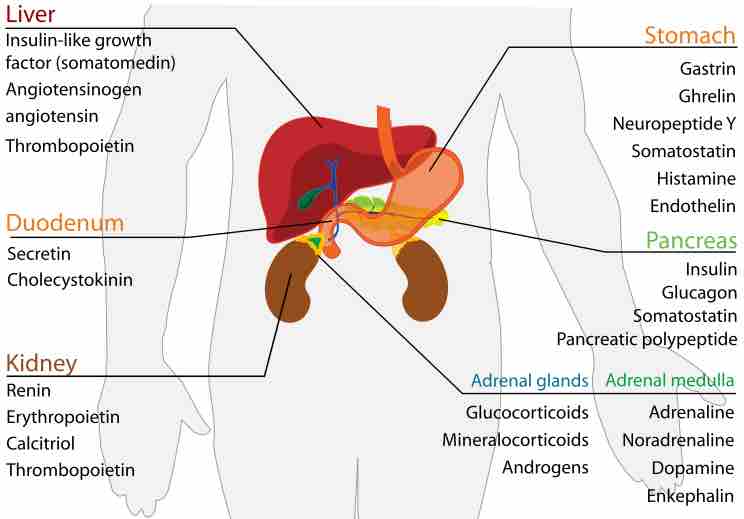Hormonal Responses to Food
The endocrine system controls the response of the various glands in the body and the release of hormones at the appropriate times. The endocrine system's effects are slow to initiate, but prolonged in their response, lasting from a few hours up to weeks. The system is made of a series of glands that produce chemicals called hormones. These hormones are chemical mediators released from endocrine tissue into the bloodstream where they travel to target tissue and generate a response.
One of the important factors under hormonal control is the stomach acid environment. During the gastric phase, the hormone gastrin is secreted by G cells in the stomach in response to the presence of proteins. Gastrin stimulates the release of stomach acid, or hydrochloric acid (HCl), which aids in the digestion of the majority of proteins. However, when the stomach is emptied, the acidic environment need not be maintained and a hormone called somatostatin stops the release of hydrochloric acid. This is controlled by a negative feedback mechanism.
In the duodenum, digestive secretions from the liver, pancreas, and gallbladder play an important role in digesting chyme during the intestinal phase. In order to neutralize the acidic chyme, a hormone called secretin stimulates the pancreas to produce alkaline bicarbonate solution and deliver it to the duodenum. Secretin acts in tandem with another hormone called cholecystokinin (CCK). Not only does CCK stimulate the pancreas to produce the requisite pancreatic juices, it also stimulates the gallbladder to release bile into the duodenum .

Digestive endocrine system
Hormones, such as secretin and cholecystokinin, play important roles in digestive processes. These hormones are released from endocrine tissue to generate specific controls in the digestion of chyme. As seen in the image, hormones are vital players in several bodily functions and processes.
Another level of hormonal control occurs in response to the composition of food. Foods high in lipids (fatty foods) take a long time to digest. A hormone called gastric inhibitory peptide is secreted by the small intestine to slow down the peristaltic movements of the intestine to allow fatty foods more time to be digested and absorbed.
Understanding the hormonal control of the digestive system is an important area of ongoing research. Scientists are exploring the role of each hormone in the digestive process and developing ways to target these hormones. Advances could lead to knowledge that may help to battle the obesity epidemic.